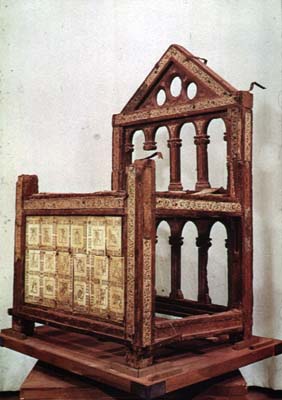02: Carolingians and the Republic of the Romans
Transformations: from ancient Mediterranean to medieval Europe
Pope as religious leader of “Latin Europe;” political leader of central Italy
Noble’s argument
2 big transitions with 2 corollaries
- Central Italy: from Byzantine region to independent entity under pope
- Franks establish major power center north of Alps (along with n. Italy)
Beginning of the end of Byzantine control west of the Adriatic
Papacy had key role in legitimizing (some) rulers
800 (Christmas, Vatican) Leo III (795-816) crowns Charlemagne Emperor of the West
Political narrative: formation of papal states, rise of Franks
Rome ca 680
With countryside, a Byzantine duchy (dux: military leader); under Ravenna, under Constantinople
Lombards (arrived 568) to north and south, kingdom to north (Pavia)
Military defense: local wealthy people
Growing regional diversity
Rome’s countryside: church (all institutions) single landowner
Emphyteusis rent payments in kind (Church: charity)
720s-50s: papal control, label “republic”
- Rome: pope and officials already in charge (little Byzantine presence)
- Enemies: Lombards, Byzantines
- Byzantine goal: enforce iconoclasm
- Lombards goal extend control to make one contiguous regime
- Pope Zachary (741-52) negotiates with Lombards in his own name
- 751 Lombards capture Ravenna. End of exarchate
Franks
Merovingian dynasty; Pepin, mayor of the palace, requests recognition as king of Franks from Zachary
Pope Stephen II (752-57)
- 754 Pavia (Aistulf; unsuccessful);
- Paris: requests aid from Pepin, re-consecrates him as king
- Boniface: organizing church in Francia
- 755 Pepin defends Rome against Lombards; first treaty signed
- 756 Aistulf besieges Rome; Stephen requests aid; Pepin returns, defeats Aistulf again; Aistulf pays tribute, hands over cities
- “republica romanorum”
- 757 Stephen supports of Desiderius as king of Lombards, who promises to return some cities but goes to war instead; death of Stephen II followed by instability
768 death of Pepin; realm divided between sons Carloman (d. 771; regions near Italy) and Charles
Intrigue on all sides
757-67 Paul I (brother of Stephen II)
768-72 Stephen III
Hadrian I (772-795)
Franks-Lombards-Rome
774 Charles defeats Desiderius at Pavia: exile (Corbie Abbey); Charles king of Italy
780s-90s Charles makes several visits to Italy; expands papal lands
799 Leo III attacked in Rome, requests aid from Charles
800 Charles travels to Rome, crowned; condemns Leo’s attackers
“Donation of Constantine”

Cathedra Petri (Throne of St. Peter) Charles II the Bald, 823-877. Rome, St. Peter, Vatican
Made for Carolingian monarch Charles the Bald; probably donated on his coronation, Christmas Day, 875
